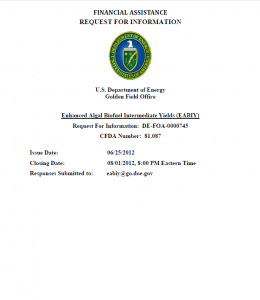The U.S Department of Energy has issued a Funding Opportunity Announcement (FOA) titled Innovative Pilot and Demonstration Scale Production of Advanced Biofuels.
This FOA seeks to identify, evaluate, and select innovative pilot- or demonstration-scale integrated biorefineries that can produce hydrocarbon fuels that meet military specifications. This includes specifications for JP-5 (jet fuel primarily for the Navy), JP-8 (jet fuel primarily for the Air Force), or F-76 (diesel). Ethanol and Biodiesel are not eligible for this opportunity.
The DOE anticipates granting 2-4 awards that will range from $5 million to $7 million. Concept papers must be submitted to the EERE eXCHANGE website by July 16, 2012.
This FOA is part of an effort designed to spur markets for fuel production, and algae producers should consider responding. Novel and highly innovative technologies are strongly encouraged.



